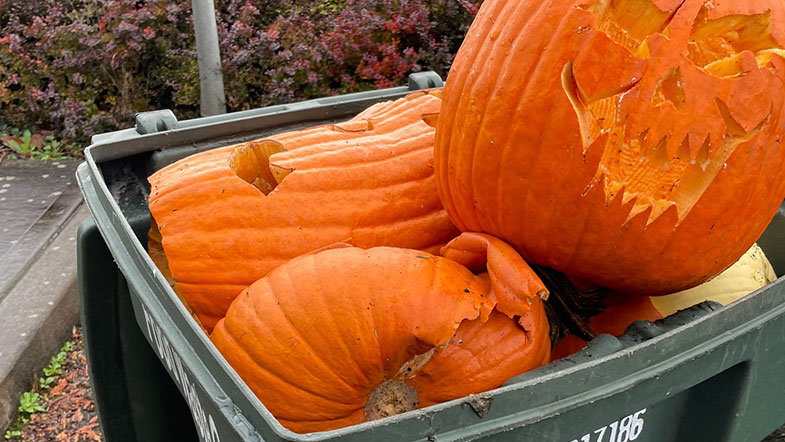Fall season has arrived and everything is pumpkin flavored! Time to pick out your favorite costume and decide which scary monster to transform your pumpkin into.
Many of us enjoy a good scare during Halloween, but most don’t know about the true terror that happens when the festivities end: the waste! Especially the 1 billion pounds of pumpkins that end up in the landfills. Landfills are an anaerobic environment (lacking oxygen) causing organic material like pumpkins to produce methane, which is a greenhouse gas at least 28 times as potent as carbon dioxide. Additionally, pumpkins are made of 90% water which contributes to the production of leachate.
Instead of throwing out your pumpkins and sending them to the landfill, remember that composting organic waste is the most sustainable option! Nutrients found in pumpkins are healthy for us, animals and the environment when we dispose of them properly. Pumpkin’s flesh is high in fiber and their seeds can be rich in potassium and protein. Yet only a fifth of the pumpkins we grow are processed for food products like canned pumpkin.
This is our opportunity to make sure our pumpkins and the nutrients they hold are put to good use!

Compost curbside with your yard debris or organics cart
In Clark County, pumpkins are accepted in yard debris carts during the months of October and November.
In Camas and Washougal pumpkins are not accepted in yard debris carts. Camas and Washougal residents can compost pumpkins for free using the We Compost Community Hub program.
In the cities of Vancouver and Ridgefield, pumpkins are accepted in organics carts all year.
Find your nearest We Compost Community Hub!
If you don’t have a curbside option, check out the We Compost pilot program and find the nearest drop-off site near you! We Compost Community Hubs are available to all Clark County residents, providing an option to dispose of all food scraps (not just pumpkins).
Create healthy soil by backyard composting
If your pumpkins have been sitting out and are starting to decompose, then it’s the perfect time to add them to your backyard compost pile. For best results, break or cut your pumpkins into smaller pieces before adding them to your pile. This will help the microorganisms break them down faster. Remember to remove the seeds, unless you want pumpkins growing in your compost or garden. Also make sure to add some dry carbon material, like leaves or newspaper, since pumpkins are mostly water!
If you don't know how to backyard compost but want to learn, the Composter Recycler program is an amazing resource to begin at no cost. You don't need specialized equipment to get started, just a bit of knowledge! Visit the Composter Recycler website to learn more about how you can start composting your pumpkins in your own backyard, register to attend free online composting education workshops and view recordings of past webinars.
If you don’t have a compost pile but still want to benefit from the nutrients your pumpkins can provide, then simply bury small pieces of the pumpkin in your garden. As they break down, the nutrients will enrich the soil around your garden and create healthier, happier plants.
Eat what you can!
- If you haven't carved or decorated your pumpkin yet, you can find endless recipes online for how to consume your pumpkin, from the seeds to the skin!
- Roasted pumpkin seeds are a healthy and yummy snack. They can be eaten by themselves or within trail mix and salads! Peeled pumpkin skin can be dehydrated and eaten as a simple pumpkin chip snack. Add a cinnamon stick and boil pumpkin skin to create a delicious tea.
- You can puree the pumpkin flesh to include in sweet or savory dishes. Some recipe ideas include a classic pumpkin pie, pumpkin bread, pumpkin lasagna, pumpkin soup, pumpkin butter and pumpkin hummus. There are so many options to try!
- If you don’t want to eat the pumpkin puree, it is full of nutrients and vitamins that are ideal for creating a DIY natural face mask. Pumpkin puree is also great for our four-legged friends; its vitamins and nutrients benefit their skin and digestive tract!
Feed to animals or donate to a local farm
Make a bird feeder
You can create a DIY bird feeder using half of the pumpkin and filling it with bird seed. You can even cook the pumpkin seeds without seasoning and add them to the bird seed.
Feed your chickens
Chickens are known to enjoy eating pumpkins. If you or a neighbor have chickens, you could consider adding pumpkins to their feed! Be sure to do this when the pumpkin is still fresh and has not started to mold.
Donate to a local farm
Some local farms accept pumpkin donations to feed to their animals. Just remember to remove any paint or decorations before donating so the animals only eat delicious pumpkins.
- Gather and Feast Farm is in La Center and hosts their own pumpkin recycling program, allowing you to feed their Scottish Highland Cows and goats!
- Dawning Day Farm is in Battle Ground and encourages its customers and neighbors to donate their pumpkins to feed their cows and other livestock.
By keeping food waste out of your garbage, you’re reducing negative impacts on the environment, keeping the smell out of your house and creating healthy compost that goes back into the earth.


